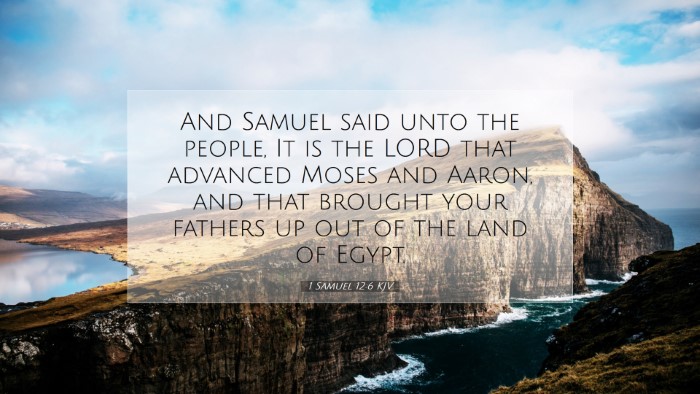Commentary on 1 Samuel 12:6
Verse: “And Samuel said unto the people, It is the LORD that advanced Moses and Aaron, and that brought your fathers up out of the land of Egypt.”
Introduction
The context of 1 Samuel 12 is pivotal as it marks a transitional moment in Israel’s history where Samuel addresses the nation after appointing Saul as king. This verse reflects on God's sovereignty and His role in Israel's deliverance, highlighting the faithfulness of God in guiding His people through their leaders.
Historical Context
This passage comes at a time when Israel was shifting from a theocratic to a monarchic system of governance. Samuel, as both prophet and judge, reminds the people of the historical context of their deliverance from Egypt. By invoking the memories of Moses and Aaron, Samuel connects the current political changes back to the foundational acts of God in Israel's history.
Exegesis and Commentary
Divine Providence and Leadership
Matthew Henry notes that Samuel seeks to reaffirm the people's understanding of who truly leads Israel. He emphasizes that God was the one who “advanced” Moses and Aaron as leaders. This reflects the biblical principle that God appoints leaders for His purposes and that their authority is ultimately derived from His will.
Covenantal Remembrance
Albert Barnes stresses the importance of remembering God’s past deliverances as a means to reinforce faith in His future guidance. He suggests that by recalling the exodus, Samuel invites the people to acknowledge God's continuous presence and His unchanging promises throughout their tumultuous history.
The Role of Memory in Faith
Adam Clarke highlights the pedagogical nature of Samuel’s reminder. In ancient Israel, communal memory served as a means to instruct future generations about God's works. This act of recalling the deliverance from Egypt was not merely historical; it was intended to invoke a sense of trust in God’s ongoing providence as they navigated the uncertainties of kingship.
Theological Implications
The Nature of God’s Sovereignty
This verse encapsulates the idea that despite the people’s request for a king—an act of apparent rebellion against divine rule—God was still in control. The statement made by Samuel acknowledges God's unrelenting sovereignty where He orchestrates history for the good of His people.
- God as Deliberate Leader: The advancement of Moses and Aaron signifies that God intentionally raises leaders based on His divine purpose.
- Historical Awareness: A genuine relationship with God requires understanding and awareness of one's spiritual history.
Implications for Contemporary Leadership
For pastors and leaders today, this verse serves as a reminder that true leadership should be rooted in a recognition of God’s greater sovereignty. Leaders must rely upon God’s guidance and historical faithfulness to instill trust within their congregations.
Practical Applications
Encouraging Reflection among Believers
Believers are encouraged to reflect on their spiritual heritage and the ways God has acted in their lives and the lives of their communities. Regularly revisiting stories of deliverance and faithfulness can cultivate a deeper faith and reliance on God amidst contemporary challenges.
Communal Worship and Remembrance
Churches can create practices of communal remembrance to celebrate God's past faithfulness. Worship services that recount God's deliverance through biblical history or personal testimonies can strengthen the faith community and deepen their reliance on divine providence.
Conclusion
In 1 Samuel 12:6, Samuel's reminder of God's past actions serves as a powerful theological and historical foundation for the Israelite people, illustrating the notion that God's leadership is both sovereign and purposeful. For modern-day believers, this passage invites reflection on God’s past deliverance, encourages trust in His present guidance, and highlights the importance of cultivating a historical consciousness as a community of faith.


